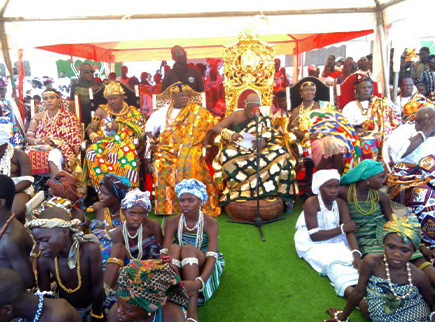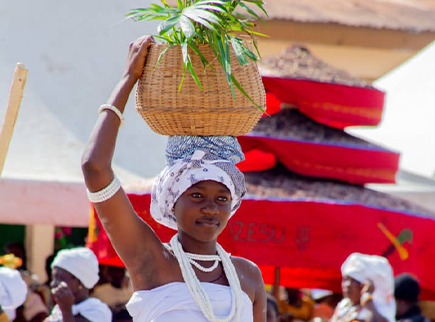Mr Eric Edem Agbana, Member of Parliament for Ketu North, has reaffirmed his commitment to transforming Dzodze into a vibrant economic hub.
“My vision is to make Dzodze a dynamic city where business activities, jobs, and economic opportunities thrive throughout the year,” he said.
Mr Agbana made the remark at Dzodze at the weekend during the celebration of the 23rd edition of the De Za (Oil Palm Festival) on the theme: “Oil Palm Odyssey — Exploring the Economic Value of Oil Palm for Industrialization and Jobs in Ketu North.”
The festival, which brought together thousands of indigenes and visitors, showcased the cultural pride of the people while highlighting the need to transform the oil palm value chain into a driver of local industrialization and employment.
Mr Agbana noted that several initiatives were underway to decentralize key government agencies in the municipality.
“Ketu North is the first municipality in Ghana to host an Environmental Protection Authority (EPA) office — a milestone in our decentralization drive. Plans are also advanced for the establishment of offices for the DVLA and the Electricity Company of Ghana (ECG), to bring essential services closer to our people,” he said.
The MP disclosed that land acquisition processes were ongoing for the construction of a 24-hour economy market in Dzodze, with the support of traditional authorities, pending government approval for funding.
On infrastructure, Mr Agbana announced that work had begun on the Ho–Denu Road under President John Dramani Mahama’s “Big Push” initiative, with contractors currently active on the Ave-Afiadenyigba–Tsaveme–Dzodze stretch.
He said consultations were ongoing on whether to upgrade the Dzodze section into a dual carriageway or diversion, assuring that affected property owners would be compensated.

Turning to agriculture, he said oil palm cultivation must become the backbone of Ketu North’s industrial vision.
“Before any processing factory can be built, we must ensure the availability of raw materials. Families with large tracts of undeveloped land are therefore encouraged to release them for agricultural investment,” he urged.
He announced the introduction of a Land Bank Project to help families lease idle lands for development and investment, adding that discussions were ongoing with interested investors in oil palm and other crops.
On education, Mr Agbana said his office had supplied 50 computers to Dzodze-Penyi Senior High School, completed and equipped the school’s clinic, and secured Bank of Ghana funding for a modern ICT laboratory.
He added that efforts were also underway to upgrade Dzodze Technical Institute into a STEM school in line with national education reforms.
“With unity among our traditional leaders and the support of all citizens, we will continue to bring progress to every community,” he concluded.
Reverend Martin Amenaki, Municipal Chief Executive (MCE) for Ketu North, said the De Za festival was not just a cultural celebration but also a symbol of innovation, unity, and resilience.
“The oil palm, our ‘tree of life,’ represents our potential for economic transformation,” he said.
He noted that although farmers across Ketu North currently cultivate about 250 acres of oil palm, productivity remained low due to the use of local varieties.
The Department of Agriculture’s 2020 distribution of 16,000 improved seedlings was largely unsuccessful due to livestock destruction, rodents, and erratic rainfall.
Rev Amenaki called for stronger community collaboration, effective livestock management, and improved irrigation to revitalize the oil palm sector.
He also addressed rising tensions between farmers and herders, emphasising that the Assembly was working with the Municipal Security Council and traditional leaders to establish controlled grazing zones and conflict-resolution committees to promote peaceful coexistence.
Touching on infrastructure, the MCE described the Ho–Denu ECOWAS Road as the “artery of trade” for Ketu North and appealed for expedited completion to boost commerce.
He also announced plans to modernize the Akanu ECOWAS Market into a cross-border trading centre to enhance regional integration.
On urban management, he said the Assembly had launched a Smart SDG Cities Initiative to decongest the Dzodze township, relocate traders to approved markets, and designate truck-parking zones to enhance public safety.
He cautioned against drug abuse, environmental degradation, and indiscipline, urging parents, youth groups, and faith leaders to help safeguard the moral and environmental health of the municipality.
“Development thrives only in discipline and order,” he stressed.
Delivering his message, Torgbui Dzoku V, Paramount Chief and President of the Dzodze Traditional Council, said the year’s theme was a call to action to redirect the ambitions of the youth toward the oil palm industry.
“This crop is our heritage — the seed around which the life and survival of our ancestors were built. We must cultivate it and make it the pivot of our industrialization,” he said.
He appealed to the MP and his team to collaborate with the Traditional Council to implement five key strategies, including promoting Public–Private Partnerships to establish oil palm processing factories; Farmer Training Programmes to improve productivity; and Youth Empowerment Initiatives to promote oil palm-based enterprises.
There should also be Infrastructure Development to support the value chain; and Community Engagement to ensure equitable participation and benefits.
Torgbui Dzoku urged citizens to uphold the values of peace, unity, and hard work.
The colourful festival featured traditional drumming, dancing, and exhibitions of oil palm products that reflected the rich heritage of the people of Dzodze.

